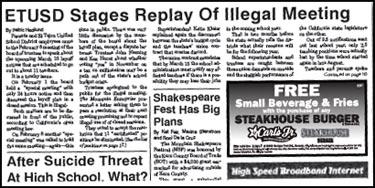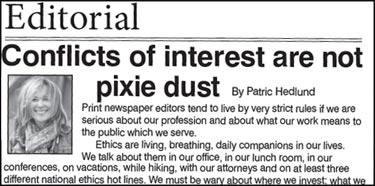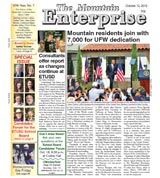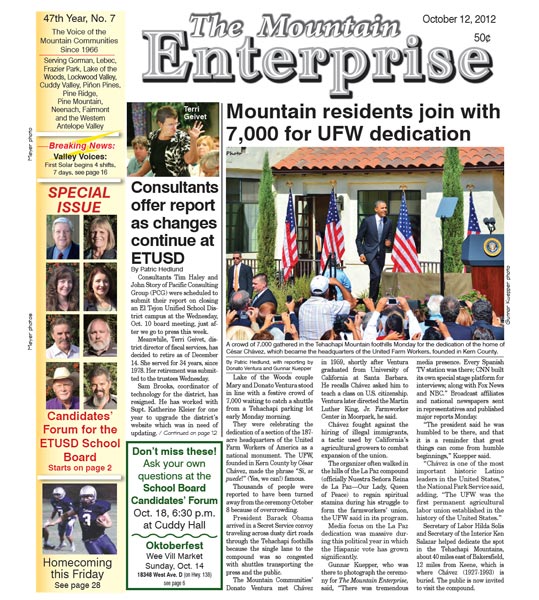
Image 1 of 2

Image 2 of 2
Transparency is a big concern we hear from the community.
A) Will you take a public pledge to follow state laws during closed board sessions?
B) Will you pledge to stand up and leave a closed board session if talk among your fellow trustees moves to an issue not allowed under the Ralph M. Brown Act and explain to your colleagues why you must leave? [An explanation of the law appears below the candidates’ responses.]
John Fleming
I will not leave meetings prior to voting. I will honor my oath of office.
Lark Shillig
A. Yes. B. No. I have confidence in new trustees. Trustees’ actions shouldn’t be dictated by media.
Vickie Mullen
I will continue to obey the law in both public and private without theatrics.
Linda Sheldon
Yes, I absolutely pledge to adhere to all regulations and will demand transparency as required.
Scott Robinson 2 Yr
A. Yes B. No, will object on record of issue, but remain to ensure compliance with law.
Bob Anderson
A) Yes B) Yes
Tim Schantzen 2 Yr
I will obey and pledge to follow all guidelines and rules set up to run all school board meetings.
Dean Crabb 2 Yr
Yes and Yes. I will not allow the people who elected me to be misrepresented.
Note on the California laws regarding public boards: The Brown Act, officially known as the Ralph M. Brown Act, was an act of the California State Legislature, authored by Assemblymember Ralph M. Brown and passed in 1953. It was enacted in response to mounting public concerns over informal, undisclosed meetings held by local elected officials. Local government bodies were avoiding public scrutiny by holding secret "workshops" and "study sessions."
The Brown Act guaranteed the public’s right to attend and participate in meetings of local legislative bodies.
It was originally a 686 word statute,but has grown over the years. Case law has added to it, including forbidding telephone or email “serial meetings” in which issues are decided by directors in advance of the pubic meeting.
Executive sessions can be held for very few issues, such as personnel matters regarding a specific employee, disciplinary matters regarding a specific student, pending litigation, labor negotiation and contact negotiations.
The Brown Act applies to California city and county government agencies, boards, including school boards, councils and water agencies. Open meetings for state government agencies are mandated by the Bagley-Keane Act.
The California Public Records Act was a law passed by the California State Legislature and signed by the Governor in 1968, mandating disclosure of governmental records to the public upon request, unless there is an authorized reason not to do so. [California Government Code §§ 6250 through 6276.48]
The law is similar to the Freedom of Information Act, but even stronger, because the phrase: “the people have the right of access to information concerning the conduct of the people’s business” is enshrined in Article 1 of the California Constitution due to California Proposition 59 (the Sunshine Amendment).
Together, these laws protect the public’s access to information and records generated by public agencies.
Conflict of interest questions from readers
Question 8: Some of you are Mormon, some fundamentalist Christian, others of varied beliefs. In what ways do you wish to bring religious teaching into the classroom? Would you vote to teach Intelligent Design in the public school district? Why?
John Fleming
I have never brought my religious beliefs as a member of The Church of Jesus Christ of Latter-day Saints into ETUSD issues. Teaching Intelligent Design is illegal and will not be taught at ETUSD.
Lark Shillig
You’ve asked 3 questions disguised as one! I cannot reasonably address such questions posed by you from anonymous “readers.” My blanket statement is: It is unacceptable to bring religion into a governmental election.
Vickie Mullen
I trust that in a country founded by people of faith that this community is tolerant of people of faith running for public office.
Intelligent Design cannot be taught in public schools. [See answer #7]
Scott Robinson 2 Yr
I believe in separation of church/state. Teaching of any specific religion should be prohibited in accordance with long standing U.S. Supreme Court rulings. No teaching Intelligent design, it’s a belief, has no scientific foundation.
Linda Sheldon
Religious teachings shouldn’t be in public schools. Intelligent Design, aka “creation science”, is an attempt to skirt around the ruling of U.S. Supreme Court case Edwards v. Aguillard in 1987. Therefore, I would vote no.
Tim Schantzen 2 Yr
Teaching about religions has a place in classrooms to teach children about the world in which they live. Teaching about Intelligent Design should be limited to this type of teaching.
Bob Anderson
As a Christian I’m taught to respect others – something we can all learn. Intelligent Deign is a mute issue based on a 2005 court settlement stating it can not even be brought up
Dean Crabb 2 Yr
I do not believe religion should be taught in public schools. I would not elect to teach Intelligent design, it blends both god and science. Religious teachings could create animosity.
———
Question 9: Readers have requested that we ask this question of all candidates. Three candidates derive a substantial part of their family income from the school district, through their spouse’s employment as teachers. If several teacher spouses are elected, how can your board objectively discuss issues related to teachers? How would the board govern if recusing members for conflict of interest would deprive the board of a quorum?
John Fleming
California law will let them vote.
The rule in Washington is that officials may record a vote of “Present” instead of yea or Nay. Voting “Present” still keeps a quorum.
Lark Shillig
The superintendent gave 4 FMHS teachers “notice.” They fought the superintendent’s decisions themselves! They filed the proper legal documents. In court, the Judge ruled in their favor. Board action was /…..
Vickie Mullen
Only after researching the laws on conflict of interest and quorum ramifications did I decide to run. We need knowledgeable board members who will not acquiesce reflexively to the superintendent.
Scott Robinson 2 Yr
Trustees with potential conflicts should be required to recuse themselves and procedural rule adopted that majority of remaining trustees are able take action. Otherwise, work of trustees could be stymied.
Linda Sheldon
This is a serious concern. The board must have a quorum and members must be able to vote objectively; therefore, a teacher’s spouse should not be on the board.
Tim Schantzen 2Yr
As a trustee, I will have a fiduciary duty to represent the school district’s interests, not any teacher. I will exercise this duty faithfully to avoid conflicts of interest.
Bob Anderson
The board could not function. Your example opens too many potential areas of conflict.
Dean Crabb 2Yr
My family is not employed with district. I won’t let the fact that I am speaking with teachers spouses change my position. A deprived quorum is out of my control.
Hot links to QUESTIONS
0) Candidates photos and introduction
1) Candidates’ goals as trustees
2) Students’ performance
3) Charter school’s leadership
4) Closing a campus
5) Role of trustees in regard to superintendent
6) Temperament and the board
7) Transparency
8) Possible Conflicts of interest: Religion
9) Possible Conflicts of Intereat: Financial
10) Impact of schools on local economy
11) The last word
This is part of the October 12, 2012 online edition of The Mountain Enterprise.
Have an opinion on this matter? We'd like to hear from you.


